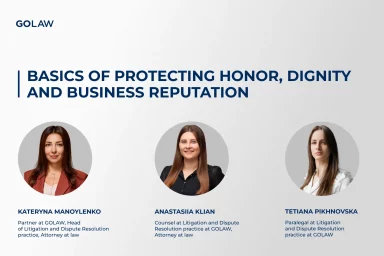The most common mistakes made by employees during investigative actions at an enterprise
Contents
- Unpreparedness of employees
- Lack of a designated responsible person
- Neglecting to check documents
- Lack of supervision over the investigation
- Excessive interaction
- Employee behavior
- Failure to inform a lawyer in a timely manner
- Lack of detailed recording of property seized during the search
- How to minimize risks during a search
Most often, problems arise due to the commonplace unpreparedness of employees for such events, particularly a lack of instructions, misunderstandings of their rights and responsibilities, and careless handling of documents or equipment.
Unpreparedness of employees
Employees’ mistakes are usually caused by the lack of prior preparation for a visit from law enforcement agencies to the company. Investigative actions start unexpectedly, so in the absence of a clear algorithm of actions, employees may become confused or even aggressive towards law enforcement officers.
Sometimes, employees are unaware of their rights and obligations in such situations. They may not understand which documents to request from law enforcement officials, what information to provide access to, what actions they can object to, or how to do so.
This situation can be resolved in advance by providing clear written instructions, internal procedures, and basic training for staff on the algorithm of actions during a search.
Lack of a designated responsible person
When preparing for possible investigative actions, employees should understand not only the general rules of interaction with law enforcement agencies but also their own role in this process.
First of all, it is necessary to identify a responsible person from the company who has experience or legal training, coordinates actions with a lawyer, and immediately calls the latter, is authorized by the job description and can take over all communication with law enforcement representatives until the lawyer arrives. The rest of the team should be informed that only this person is in charge of communication.
Neglecting to check documents
Verification of documents confirming the legitimacy of the investigative action is the main way to protect your rights, and it is imperative to use it.
Before entering the company, it is worth checking the investigating judge’s decision to authorize a search, as well as the law enforcement credentials of the persons conducting the search. The ruling should include, in particular
- its validity period;
- the address where the search is to be conducted;
- the name of the investigator/prosecutor upon whose motion the warrant was issued;
- the person who owns the real estate and the person who is actually there (name of the company);
- things, documents or persons to be searched for.
The purpose of a thorough review of the documents is not only to check whether there are grounds for preventing law enforcement officials from entering the company (for example, the address of the place of the investigative action is incorrectly indicated in the decision or the law enforcement officials lack authority), but also to ensure that the lawyer has sufficient time to arrive at the company.
Lack of supervision over the investigation
A significant mistake can be the lack of supervision over the actions of law enforcement officers during an investigative action. For example, when it comes to the search of the premises, it is important to ensure that all law enforcement officials are concentrated in one room, in the presence of a responsible person and witnesses, and within the field of view of a video recording device.
All actions must be consistent so that control can be ensured. Otherwise, when everything happens chaotically, in several rooms at once without proper supervision, there is a risk of unfair actions by the persons conducting the search (damage/disappearance of the company’s property, etc.).
Excessive interaction
Often, law enforcement officers initiate communication with the staff about the company’s activities on their own. Employees don’t even notice how they are facilitating the work of law enforcement in their desire to show law-abidingness.
They explain internal processes, openly share details of the company’s business activities, and voluntarily provide documents or items that are not specified in the court order. All of these are examples of excessive and sometimes illegal cooperation.
Law enforcement officers are not required to warn employees that they are exceeding their duties. They are interested in collecting evidence and obtaining as much information as possible.
To prevent this, it is worth explaining to employees the clear boundaries of interaction: a simple “excuse me, I am not authorized to answer this question, you can contact the person in charge” can protect the company from undesirable consequences.
Employee behavior
In addition to their own rights and responsibilities, it is also important for employees to understand the rules of conduct during investigative actions. Employees may behave defiantly or aggressively, fail to comply with the instructions of law enforcement officials, or disregard the advice of a lawyer.
Panic or aggressive behavior not only interferes with the legal support process but also creates additional risks for the company. In the worst-case scenario, such actions may be regarded as obstruction of investigative actions, and careless or emotional statements by employees may be recorded and disseminated in the media.
Alternatively, employees may not attach sufficient importance to the situation and post information about the search on social media. Sharing photos, videos, or even short posts such as “we’re being searched” can seriously damage a business’s reputation, especially if the situation is later resolved or the search turns out to be unsuccessful. All public statements should be made through a lawyer or PR service, not through the emotional reactions of employees.
Failure to follow the instructions of management or a lawyer is equally dangerous. If employees do not follow clearly written instructions or start acting “at their own discretion,” this can destroy the defense strategy prepared by lawyers.
At the same time, you should not shift the responsibility entirely to employees. The main defense in such a situation is provided by a lawyer, not an office manager or accountant.
Failure to inform a lawyer in a timely manner
Legal support during investigative actions is a crucial element in protecting a company’s rights. In the absence of a lawyer during investigative actions, there is an increased risk of abuse by investigators, violation of the established procedure for conducting investigative actions, and loss of important information or property by the company. In addition, it is the lawyer who will be able to thoroughly record all violations committed by law enforcement officers during the search and indicate them in the search report.
First, it is essential to consider the possibility of quick access to a lawyer in advance. The company should ensure constant contact with a lawyer who is well aware of the specifics of the company’s activities and is able to arrive at the scene in time.
Employees should immediately notify the legal department/authorized person in the event of any investigative actions. They should know whom to notify, how to contact a lawyer, and have access to their contacts.
By law, a lawyer has the right to be present at any stage of the investigation. Failure to allow a lawyer to be present without proper grounds may be considered a violation of the rights of the participants in the process and a ground for declaring the evidence obtained inadmissible. The staff should insist on the presence of a lawyer and not sign any documents before his or her arrival.
Lack of detailed recording of property seized during the search
Particular attention should be paid to the proper recording of all law enforcement actions, including a detailed description of the seized and temporarily seized property. The search protocol is a procedural document that is key to protecting the rights of the company and to further appealing against unlawful actions. Inadequate recording of property or a formal indication, such as “documents in blue folders were seized” or “equipment was seized” creates risks of damage or loss of property.
That is why it is essential to insist that the search report include a comprehensive list of each seized item, including name, quantity, serial numbers (for equipment), details (for documents), and physical condition. This approach not only guarantees transparency of the investigators’ actions but also protects the company in the event of further legal disputes, facilitates the return of property and minimizes reputational and financial losses.
How to minimize risks during a search
To minimize risks, companies should take a number of preventive measures.
First of all, it is worth developing internal policies and instructions that clearly regulate the actions of employees in the event of searches or other investigative actions. These documents should be simple, clear and accessible to every employee.
In addition, it is worthwhile to conduct training or coaching to explain their rights and responsibilities to employees, as well as to rehearse typical scenarios of behavior in crisis situations. This will reduce the level of panic and avoid impulsive decisions.
The company should also ensure that it has permanent legal support in advance. A lawyer who is familiar with the business should be in touch and ready to quickly arrive at the place of investigation. This approach will allow you to respond promptly to violations by law enforcement and ensure legal protection at all stages.
Comprehensive preparation is the key to maintaining control over the situation and minimizing potential negative consequences.

Kristina Kolchynska
Counsel, Attorney at Law
- Contacts
- 31/33 Kniaziv Ostrozkykh St, Zorianyi Business Center, Kyiv, Ukraine, 01010
- k.kolchynska@golaw.ua
- +38 044 581 1220
Get in touch
To get a consultation, please fill out the form below or call us right away:Sign up to be aware
New achievements are inspired by information. GO further, don’t miss out GOLAW news and legal alerts
Our expertise
-
- Energy and Natural Resources
- Antitrust and Competition
- Banking and Finance
- Compliance, Corporate Governance and Risk Management
- Corporate and M&A
- Criminal and White Collar Defence
- Defense in Anti-corruption procedures and regulations
- Labor and Employment
- Natural Resources and Environment
- Government Relations (GR)
- Insolvency and Corporate Recovery
- Intellectual property
- International trade
- Legal support of business and private Сlients in Germany
- Litigation and dispute resolution
- Private clients
- Real Estate and Construction
- Restructuring, Claims and Recoveries
- Martial Law
- Tax and Customs
-
- Agribusiness
- Aviation
- Chemical industry
- Engineering, Construction and Building Materials
- Natural Resources and Environment
- Financial institutions
- IT and AI
- Industry and manufacturing
- Healthcare industries, Life sciences and Pharmaceuticals
- Media, Entertainment, Sports and Gambling
- Retail, FMCG and E-Commerce
- Transport and Logistics
We use cookies to improve performance of our website and your user experience.
Cookies policy
Cookies settings







